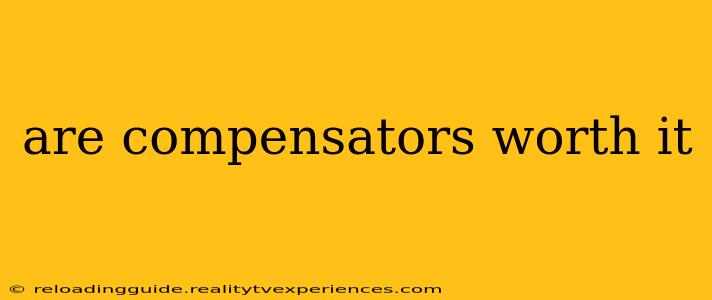Are you considering adding a compensator to your firearm? This decision hinges on several factors, and this guide will delve deep into the pros and cons to help you determine if a compensator is the right choice for you. We'll explore different types, their effectiveness, and the overall impact on your shooting experience.
What is a Compensator?
A compensator is a muzzle device designed to reduce recoil and muzzle rise. Unlike a suppressor (which reduces sound), a compensator primarily focuses on mitigating the upward and backward forces generated when a firearm discharges. This is achieved through strategically placed ports that redirect propellant gases, counteracting the recoil impulse.
The Pros of Using a Compensator
-
Reduced Recoil: This is the primary benefit. By redirecting gas, compensators significantly lessen the felt recoil, leading to faster follow-up shots and improved accuracy, especially in rapid-fire situations.
-
Improved Accuracy: Less recoil translates directly to better accuracy. The shooter can maintain a more consistent sight picture, resulting in tighter groups and improved performance at longer ranges.
-
Faster Target Acquisition: Reduced muzzle rise allows the shooter to get back on target faster after each shot, enhancing their ability to engage multiple targets quickly and efficiently.
-
Increased Control: The enhanced stability provided by a compensator contributes to greater overall control of the firearm, particularly beneficial for less experienced shooters or those firing larger-caliber weapons.
The Cons of Using a Compensator
-
Increased Noise: While not as significant as the noise reduction offered by a suppressor, some compensators can slightly increase the perceived sound of the gunshot due to the escaping gases.
-
Potential for Gas to Blow Back: Depending on the design and positioning of the ports, some gas might be redirected towards the shooter. This can be uncomfortable, particularly in enclosed spaces.
-
Added Weight and Length: Compensators add length and weight to the barrel, which might slightly affect maneuverability, especially in close-quarters scenarios.
-
Cost: Compensators can range in price, adding to the overall cost of your firearm setup.
-
Legal Considerations: It's crucial to check local, state, and federal regulations regarding the legality of compensators. Some jurisdictions may have restrictions or require permits for their use.
Different Types of Compensators
Compensators come in various designs, each with its approach to gas redirection:
-
Port-Style Compensators: These feature ports drilled into the muzzle device to vent gases upward and/or sideways. Their effectiveness varies depending on the port configuration.
-
Linear Compensators: These redirect gases primarily to the sides, minimizing upward muzzle lift.
-
Hybrid Compensators: These combine elements of both port-style and linear compensators for a balance between recoil reduction and muzzle rise mitigation.
Are Compensators Worth It for You?
The ultimate answer depends on your individual needs and priorities.
Consider a compensator if:
- You prioritize recoil reduction and accuracy.
- You engage in rapid-fire shooting.
- You shoot larger-caliber weapons with significant recoil.
- You desire enhanced control and stability.
Consider against a compensator if:
- You are concerned about increased noise or gas blowback.
- Maneuverability is a critical factor in your shooting environment.
- You are on a tight budget.
- Legal restrictions apply in your area.
Before purchasing a compensator, research compatible models for your specific firearm and consult with experienced shooters or professionals to determine the best fit for your needs. Careful consideration of the pros and cons, along with a clear understanding of your shooting style and environment, will help you decide if a compensator is a worthwhile investment.

